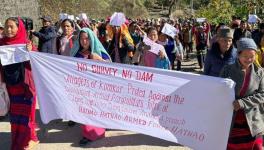It has Never Been About Rape

In broad daylight on February 19, a mob of over a hundred people assembled in front of the police station at Tezu and demanded that two rape accused be handed over to them. The police refused, prompting the mob to force their way in and take the two accused out of police custody. The two accused were paraded till the traffic junction where they were lynched. The mob tried to set the bodies on fire, however, by then the police authorities managed to gain control of the situation and recovered the bodies. The deceased have been identified as Sanjay Sobar and Jagdish Lohar. All the police officials at the station have been suspended for failing to restrain the mob and protect the arrested persons. In the meantime, section 144 CrPC has been imposed in the town.
This lynching bears striking similarities to the Dimapur lynching in 2015. Here too a mob broke into the police station, dragged the accused out, paraded him and lynched him stringing his body up from the clock tower. Apart from the lack of control the police administration had in the two cases, in both cases the deceased were accused of rape and were ‘outsiders’. In the present case, the two deceased were accused of the brutal rape and murder of a minor girl. The beheaded naked body had been recovered by the police from a tea garden a few days earlier. One of the two admitted to raping the girl and then beheading her while the other had provided the dao to commit the final crime.
Unlike in the Dimapur lynching, this case had a definite specific crime that was committed. Whereas the Dimapur lynching took place on the basis of mere allegations and speculation. The Mishmi community to which the deceased child belonged has declared a boycott of the statehood day celebrations which will take place on February 20. The Chief Minister, Pema Khandu has ordered an inquiry into the lynching and expressed solidarity with the family of the deceased minor. The All Arunachal Pradesh Students Union (AAPSU) also expressed solidarity with the family of the minor and requested the state government to compensate the child’s family. AAPSU however also demanded that Inner Line Permit checks become more stringent and appealed to the ‘indigenous people’ of Arunachal Pradesh to fully cooperate with the state administration in verifying the credentials of migrant labour.
On one hand, the incident can be viewed from the lens of prevailing ‘patriarchal mindsets’ where women are ‘property’ and therefore any violation of the local men’s ‘property’ will attract swift and violent retribution. On the other hand, the Northeast is witnessing a rapid transformation of its demography particularly in the urban centres where people from the ‘mainland’ have become more numerous. The traditional utilitarian view of this circumstance would be that the issue is economic, that there is greater competition for jobs. The problem with this view is that the Northeast is not Maharashtra.
In Arunachal Pradesh, or to be more specific, Loyul, prior to intervention from the Indian State, criminal and civil justice operated on the principle of ‘compensation’. For the Tani tribes compensation would be paid in mithun, a bovine. The greater the number of mithun owned, the higher the status of the person. Therefore, the punishment for murder would be determined in terms of heads of mithun to be paid, the same for rape and other crimes. Mithun are still paid to the bride’s family during a marriage. Other tribes may have had other similar concepts of compensation to be paid, however, the idea of ‘blood money’ remains. Several criminal cases have been dropped in Arunachal Pradesh when the accused has agreed to pay the victim’s family some form of compensation. Failure to make the payments often results in ‘revenge killings’, either when the person has served the sentence or been acquitted. When the perpetrators of a crime are not local, the question of compensation does not arise. This gets further aggravated as an issue of pride, that the community allowed a person to come from ‘outside’, commit a heinous act, and let them get away. That there is a lack of faith in the modern system of justice should be obvious.
Get the latest reports & analysis with people's perspective on Protests, movements & deep analytical videos, discussions of the current affairs in your Telegram app. Subscribe to NewsClick's Telegram channel & get Real-Time updates on stories, as they get published on our website.
























